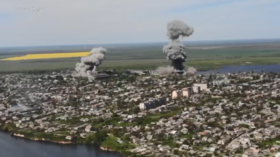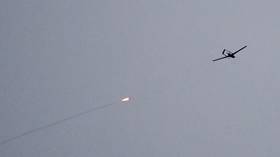US experts warn of ‘Russian air superiority’ over Ukraine

The Russian air force could wreak havoc on Ukraine’s armor and infantry if Kiev launches its much-anticipated counteroffensive without air cover, a prominent US military expert has told Newsweek. Another acknowledged supply problems with Kiev’s air defenses, while a third dismissed technical concerns to argue Ukrainian morale would prevail.
The Russians “have an almost overwhelming level of air superiority they have not introduced into the war yet,” Dale Buckner, a retired US Army officer who now heads the international security firm Global Guardian, told Newsweek.
The MiG-35, Su-35 and Su-57 jets can “decimate” the counteroffensive if they can catch armor and infantry columns in the open, said Buckner. “So there’s a real tactical risk on the ground for the Ukrainians if they don’t have proper air defense and if they don't have multiple layers of air defense,” he added.
Newsweek described the Russian Aerospace Force as “the world’s second-largest,” with an estimated 900 fighters and 120 bombers.
Buckner believes that Moscow has been holding its considerable air force in reserve “for a much larger conflict,” but might deploy at least some planes if there is a belief the Ukrainian forces lack adequate cover.
Retired US Marine General Frank McKenzie was far more optimistic about Ukraine’s chances.
“I’m not sure that we’re going to suddenly see a massive shift in the Russian approach to this war in the air,” said the former head of US Central Command who oversaw the Afghanistan withdrawal in 2021. Now at the Global and National Security Institute at the University of South Florida, McKenzie argued Russia didn’t have much “left in the cupboard” while the West was busily resupplying Ukraine.
“The heart of the people doing the conducting of those operations is a factor,” said McKenzie, arguing that the Russians lacked enthusiasm. “Part of it comes down to who can hang on the longest, who has more heart for the fight, even in a technical thing like air defense and air warfare.”
Mark Cancian of the Center for Strategic and International Studies (CSIS) think tank has noted that Kiev was redirecting air defenses to frontline units from cities and infrastructure. He told Newsweek that the Russian air force has been “risk-averse” and that he did not expect them to “roam Ukrainian skies imminently.”
“If the Ukrainian air defenses continue to deteriorate, the Russians will become increasingly aggressive,” Cancian said, adding that this “will take some time.”
In recent weeks, Russian tactical aviation has begun bombing Ukrainian targets near the frontline with modified FAB-500 glide bombs, encountering almost no resistance. Ukrainian Air Force spokesman Colonel Yury Ignat told reporters on Tuesday that Kiev was powerless to stop the bombs and pleaded for the US and its allies to send F-16 fighters.













